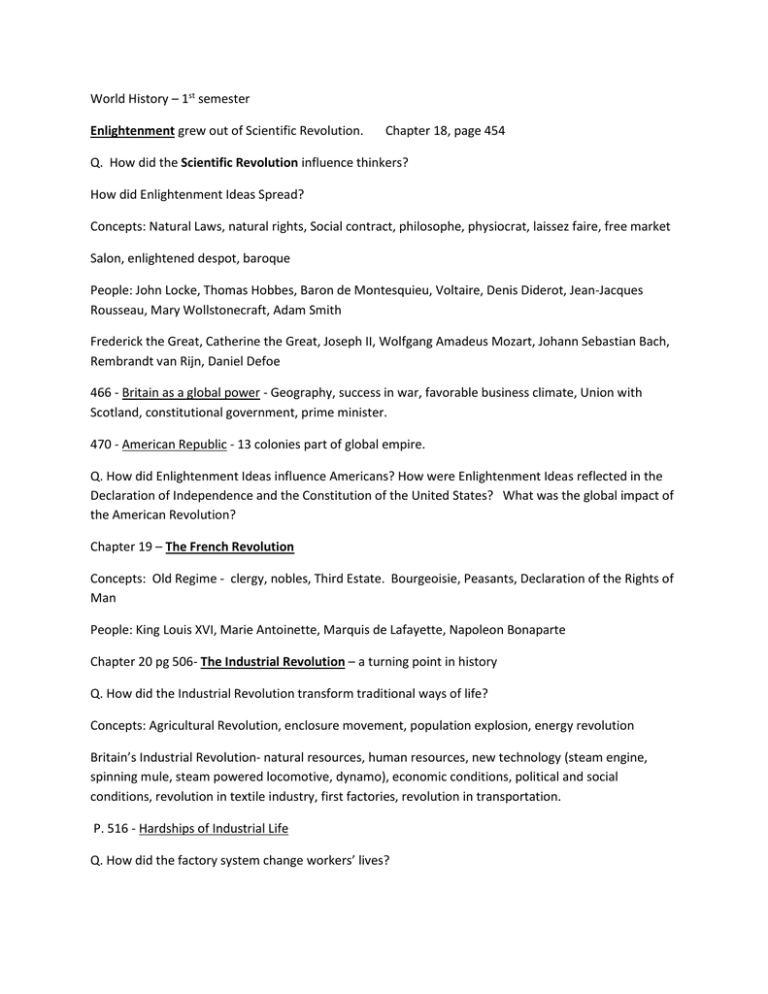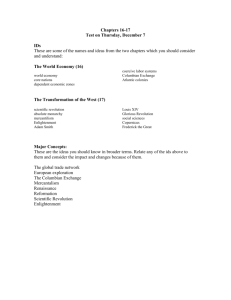semester review sheet
advertisement

World History – 1st semester Enlightenment grew out of Scientific Revolution. Chapter 18, page 454 Q. How did the Scientific Revolution influence thinkers? How did Enlightenment Ideas Spread? Concepts: Natural Laws, natural rights, Social contract, philosophe, physiocrat, laissez faire, free market Salon, enlightened despot, baroque People: John Locke, Thomas Hobbes, Baron de Montesquieu, Voltaire, Denis Diderot, Jean-Jacques Rousseau, Mary Wollstonecraft, Adam Smith Frederick the Great, Catherine the Great, Joseph II, Wolfgang Amadeus Mozart, Johann Sebastian Bach, Rembrandt van Rijn, Daniel Defoe 466 - Britain as a global power - Geography, success in war, favorable business climate, Union with Scotland, constitutional government, prime minister. 470 - American Republic - 13 colonies part of global empire. Q. How did Enlightenment Ideas influence Americans? How were Enlightenment Ideas reflected in the Declaration of Independence and the Constitution of the United States? What was the global impact of the American Revolution? Chapter 19 – The French Revolution Concepts: Old Regime - clergy, nobles, Third Estate. Bourgeoisie, Peasants, Declaration of the Rights of Man People: King Louis XVI, Marie Antoinette, Marquis de Lafayette, Napoleon Bonaparte Chapter 20 pg 506- The Industrial Revolution – a turning point in history Q. How did the Industrial Revolution transform traditional ways of life? Concepts: Agricultural Revolution, enclosure movement, population explosion, energy revolution Britain’s Industrial Revolution- natural resources, human resources, new technology (steam engine, spinning mule, steam powered locomotive, dynamo), economic conditions, political and social conditions, revolution in textile industry, first factories, revolution in transportation. P. 516 - Hardships of Industrial Life Q. How did the factory system change workers’ lives? Concepts: urbanization tenements, child labor, women in the workforce, the working class, protests, unions, the middle class New ways of thinking - Economics, Laissez-Faire, utilitarianism, socialism, communism, Marxism, proletariat, bourgeoisie, class struggle People: Thomas Malthus, Adam Smith’s economics, Jeremy Bentham, John Stuart Mill, Karl Marx Chapter 22 p. 554 – Life in the Industrial Age Q. What social, economic and intellectual developments reshaped western social values? How did art and literature reflect changing attitudes and values? Concepts: New methods of production, Interchangeable parts, assembly line, corporation, cartel, technology, steel, chemicals, electricity, railroads, gas powered internal combustion engine, monopoly, medical advances, city landscapes, sidewalks, sewers, skyscrapers, slums, women’s suffrage, racism, shifting social order, middle class values, public education, atomic theory, natural selection, Social Darwinism, social gospel, romanticism, realism, impressionism, People: Henry Bessemer, Henry Ford, Thomas Edison, Guglielmo Marconi, the Wright Brothers, Florence Nightingale, Charles Darwin, Ludwig van Beethoven, Charles Dickens, Bronte Sisters, Harriet Beecher Stowe, Claude Monet, Vincent van Gogh Chapter 23, p 582 – Nationalism Triumphs in Europe German Nation, Otto von Bismarck , Kulturkampf (battle for civilization), Kaiser William II, Balkan Powder Keg ( many people and empires contended for power) WWI- M.A.I.N. causes- Militarism, Alliances, Imperialism, Nationalism



